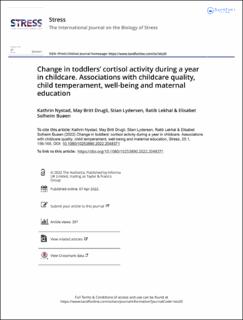| dc.contributor.author | Nystad, Kathrin | |
| dc.contributor.author | Drugli, May Britt | |
| dc.contributor.author | Lydersen, Stian | |
| dc.contributor.author | Lekhal, Ratib | |
| dc.contributor.author | Buøen, Elisabet Solheim | |
| dc.date.accessioned | 2022-08-05T07:18:11Z | |
| dc.date.available | 2022-08-05T07:18:11Z | |
| dc.date.created | 2022-04-21T10:42:27Z | |
| dc.date.issued | 2022 | |
| dc.identifier.citation | The International Journal on the Biology of Stress. 2022, 25(1), 156-165. | en_US |
| dc.identifier.issn | 1025-3890 | |
| dc.identifier.uri | https://hdl.handle.net/11250/3010234 | |
| dc.description.abstract | Elevated levels of the stress hormone cortisol have been found in toddlers in childcare. Measuring cortisol may provide an indication of children’s experiences in childcare and help to adjust practices better to their needs. To the best of our knowledge, toddlers’ cortisol levels in childcare have not yet been investigated longitudinally. Furthermore, it is unclear which child and childcare factors contribute to cortisol elevation in toddlers. Using linear mixed model analyses, we investigated the full-day cortisol activity (10.00 h, 15.00 h, 18.00 h) of 156 toddlers (81 female, 56 male) during a year in childcare (September, January, June). We also investigated child cortisol levels at home in January. In addition, we tested the relation between cortisol activity and changes in cortisol activity across the year and childcare quality, temperament, well-being in childcare, and maternal education. We found increasing evening cortisol levels through the year while controlling for age. Afternoon cortisol levels were stable, but above morning cortisol levels in September and January and only slightly below morning cortisol levels in June. At home in January, afternoon levels were significantly below morning levels. Higher well-being in childcare was associated with lower overall cortisol levels and less increase in evening cortisol levels through the year in childcare. Further, less active toddlers seemed to accumulate some stress during the childcare day, indicated by higher evening cortisol levels. Rising evening cortisol levels may indicate accumulating stress across the year. Results point toward childcare being demanding for toddlers and their need for consideration from caregivers and parents, also after a longer period of childcare attendance. The findings underline the importance of observing, promoting, and further researching children’s well-being in childcare. | en_US |
| dc.language.iso | eng | en_US |
| dc.publisher | Taylor & Francis | en_US |
| dc.rights | Navngivelse 4.0 Internasjonal | * |
| dc.rights.uri | http://creativecommons.org/licenses/by/4.0/deed.no | * |
| dc.subject | Toddler | en_US |
| dc.subject | childcare | en_US |
| dc.subject | cortisol | en_US |
| dc.subject | well-being | en_US |
| dc.subject | longitudinal | en_US |
| dc.subject | Thrive by Three | en_US |
| dc.title | Change in toddlers' cortisol activity during a year in childcare. Associations with childcare quality, child temperament, well-being and maternal education. | en_US |
| dc.title.alternative | Change in toddlers' cortisol activity during a year in childcare. Associations with childcare quality, child temperament, well-being and maternal education. | en_US |
| dc.type | Peer reviewed | en_US |
| dc.type | Journal article | en_US |
| dc.description.version | publishedVersion | en_US |
| dc.rights.holder | The Authors | en_US |
| dc.source.pagenumber | 156-165 | en_US |
| dc.source.volume | 25 | en_US |
| dc.source.journal | Stress : The International Journal on the Biology of Stress | en_US |
| dc.source.issue | 1 | en_US |
| dc.identifier.doi | 10.1080/10253890.2022.2048371 | |
| dc.identifier.cristin | 2018111 | |
| cristin.ispublished | true | |
| cristin.fulltext | original | |
| cristin.qualitycode | 1 | |

